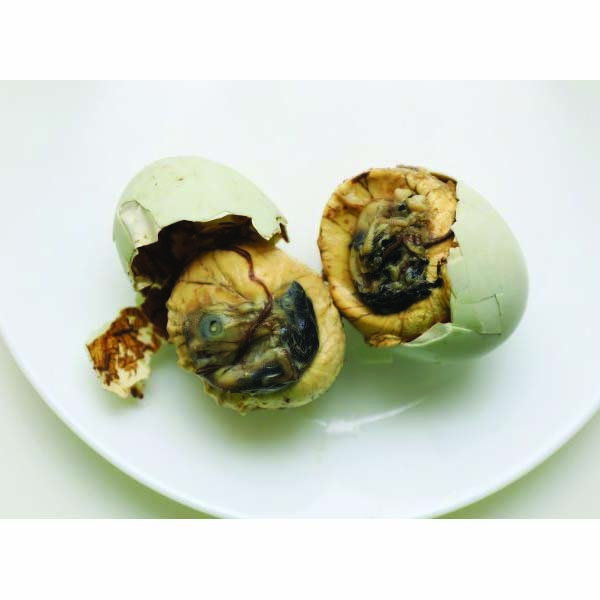Balut is a popular delicacy among Filipinos.
The late food critique, renowned Doreen Fernandez, considers balut as the Philippines’ national street food.
But what are the origins of this delicious and nutritious street food in the Philippines?
Margaret Magat, who did extensive research on balut for her master’s thesis, wrote: “Balut was introduced to the Philippines by the Chinese around 1885, and since then, it has been included as a traditional part of the culture.”
In her article on “Balut: Fertilized Duck Eggs and Their Role in Filipino Culture,” published in Western Folklore (61-1:63-96) Spring 2002, Magat further explains the origins of balut:
“Chinese traders and migrants are said to have brought the idea of eating fertilized duck eggs to the Philippines,” taking into account other historians’ observation that the Chinese food in the Philippines is the food of the streets.
Magat says this observation lends further credence to balut originating in China, with Chinese salted and century duck eggs appearing to be distant cousins of balut.
She likewise wrote about the popularity of balut beyond the Philippines. “Whenever Filipinos migrated for work, a larger market of balut would develop.”
In fact, Magat cited that Filipino Americans in California lead in balut production in the United States.
Introduced by the Chinese. Really?
Years ago, we came across a note in an anthology of classic Chinese poems published in the 1960s that balut was introduced by a Chinese in the Philippines. No details were provided.
We were not convinced of this claim because balut is not that popular among the Chinese in the Philippines. In fact, many traditional Chinese are even afraid to eat balut when they see the embryo in the duck egg.
However, we recently found another version of the origins of balut: an article written by the late Chinese historian Liu Zi Tian (劉芝田) published in the 90th Anniversary Yearbook of the Philippine-Chinese Charitable Association, Inc. 1877-1967.
Liu wrote: “We all know that Pateros of Rizal province is famous (for) its duck and balut production. Since this municipality is near the shores of upstream Pasig River, which is adjacent to Laguna de Bay, (it is) suitable for raising duck.”
He said duck raising in Pateros was started in the 18th century by Lao Chuy (劉聚), a Chinese from Fuzhou (福州), the capital of Fujian province.
“Lao Chuy,” according to Liu, “married a Filipina soon after he arrived in Manila and lived in Pateros. They had two sons, Andres and Juan Lao Chuy. Their business was duck raising. Their family (was) totally Filipinized.”
Liu narrated how Lao Chuy accidentally invented balut: He had tried to hatch a lot of duck eggs with hot charcoal.
Liu said: “Due to carelessness, the eggs were overheated and the duck eggs that had embryo were cooked by the heat. He broke open a duck egg to take a look and tried to taste it with the tip of his tongue.
“He discovered that it was delicious. He then started to sell those duck embryo eggs.”
The duck embryo eggs were a hit and their production became an industry in the town.
“People who also tried to taste it all commented that it tasted good. Thus, the balut industry was born and never slowed down a little bit,” Liu said.
We think Liu’s detailed article seems more convincing. Yet, it is interesting to note that while the Chinese are fond of eating duck, especially roasted duck and Peking Duck, they did not develop a palate for balut. On the other hand, many Pinoys are fond of balut but don’t like eating duck! What an irony!
To complete the picture, here’s more information on balut from Wikipedia: a similar preparation is known in China as maodàn (Chinese: 毛蛋, literally feathered egg), mòdàn (末蛋, end-stage egg), wàngjidàn (旺雞蛋, flush egg) or huózhuzi (活珠子, living bead).
Note, however, that this snippet does not refer in particular to duck eggs but eggs in general. In fact, it mentions chicken eggs.
It is also interesting to note that in Hokkien, the dialect used by majority of Chinese in the Philippines, balut is (鴨仔胎 â-a-tai), literally duck embryo.
Categories
Balut and the Chinese
